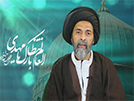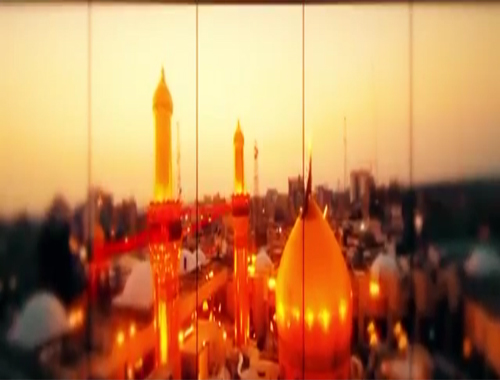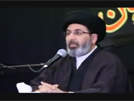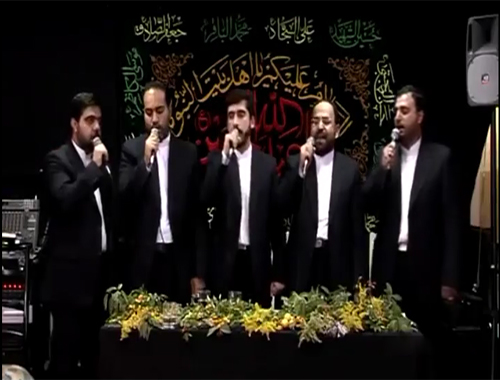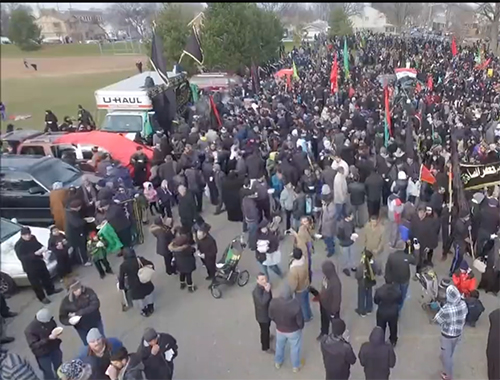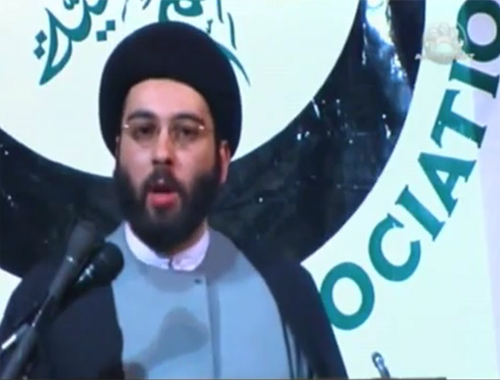Chapter 35-The Proclamation of
- Details
- Hits: 4063
The Proclamation of
Surah Bara'ah or Al Tawbah
--------------------------------------------------------------------------------
When the pilgrimage season of 9 A.H. arrived, Muhammad, the Messenger of God, had myriads of pressing duties demanding his immediate attention so that he was unable to leave Medina. He, therefore, sent Abu Bakr to Makkah as the leader of a group of three hundred pilgrims to conduct the rites of Hajj.
It was Abu Bakr's first real, out-front leadership role.
Abu Bakr and the pilgrims left Medina. A day after their departure, the Prophet received from Heaven a new revelation called Bara’ah or Al-Tawbah (Immunity or Repentence) – the ninth chapter of Qur’an, and he was specifically ordered to promulgate it in Makkah either personally or to delegate authority to do so to someone from his own family, but to no one else.
In compliance with this commandment of Heaven, Muhammad Mustafa called his cousin, Ali ibn Abi Talib, gave him his own mount to ride, and ordered him to take the new revelation to Makkah, and to promulgate it there in the assembly of the pilgrims – Muslim and pagan.
Muhammad ibn Ishaq
When Al-Tawbah came down to the Prophet after he had sent Abu Bakr to superintend the hajj, someone expressed the wish that he would send it to Abu Bakr. He said: "No one shall transmit it from me but a man of my own house." Then he summoned Ali and said: "Take this section from the beginning of Al-Tawbah, and proclaim it to the people on the day of sacrifice when they assemble at Mina." (The Life of the Messenger of God)
Washington Irving
Mohammed sent Abu Bakr as commander of the pilgrims to Mecca, he himself being too occupied with public and domestic concerns to absent himself from Medina.
Not long afterwards Mohammed summoned his son-in-law and devoted disciple, Ali, and mounting him on the swiftest of his camels, urged him to hasten with all speed to Mecca, there to promulgate before the multitude of pilgrims assembled from all parts, an important sura of the Koran, just received from heaven.
Ali executed his mission with his accustomed zeal and fidelity. He reached the sacred city in the height of the great religious festival. He rose before an immense multitude assembled at the hill of Al-Akaba, and announced himself a messenger from the Prophet, bearing an important revelation. He then read the sura of which he was the bearer; in which the religion of the sword was declared in all its rigor.
When Abu Bakr and Ali returned to Medina, the former expressed surprise and dissatisfaction that he had not been made the promulgator of so important a revelation, as it seemed to be connected with his recent mission, but he was pacified by the assurance that all new revelations must be announced by the Prophet himself, or by some one of his immediate family. (The Life of Mohammed)
Sir William Muir
Towards the close of the pilgrimage, on the great day of sacrifice, at the place of casting stones near Mina, Ali read aloud to the multitudes who crowded round him in the narrow pass, the heavenly command.
Having finished the recitation of this passage, Ali continued: "I have been commanded to declare unto you that no Unbeliever shall enter paradise. No idolater shall after this year perform the pilgrimage; and no one shall make the circuit of the Holy House naked. Whosoever hath a treaty with the Prophet, it shall be respected till its termination. Four months are permitted to every tribe to return to their territories in security. After that the obligation of the Prophet ceaseth."
The vast concourse of pilgrims listened peaceably till Ali ended. Then they broke up and departed every man to his home, publishing to all the tribes throughout the peninsula the inexorable ordinance which they had heard from the lips of Ali. (The Life of Mohammed, London, 1877)
Muhammad Husayn Haykal
...After he (Ali) finished his recitation of the Quran, he continued in his own words: "O men, no unbeliever will enter Paradise; no polytheist will perform pilgrimage after this year; and no naked person will be allowed to circumambulate the Kaaba. Whoever has entered into a covenant with the Prophet of God – may God's peace and blessings be upon him – will have his covenant fulfilled as long as its term lasts." Ali proclaimed these four instructions to the people and then gave everybody four months of general peace and amnesty during which anyone could return safely home. From that time on, no idolater performed the pilgrimage and no naked person made the circuits of the Kaaba. From that day on, the Islamic State was established. (The Life of Muhammad, Cairo, 1935)
Ali ibn Abi Talib "rehearsed the Signs of God" in Mina, representing the Messenger of God. This should be borne in mind by the reader that "rehearsing the Signs of God" is a most important function. It is, in fact, so important that God Himself has assumed it. We read in Qur’an:
These are the signs of Allah: We rehearse them to thee in Truth: Verily thou art one of the Apostles. (Chapter 2; verse 252)
This is what We rehearse unto thee of the Signs And the message of Wisdom. (Chapter 3; verse 58)
These are the signs of Allah: We rehearse them to thee in Truth: And Allah means no injustice to any of His creatures. (Chapter 3; verse 108)
According to these verses, God Himself rehearsed His Signs to Muhammad, His Messenger, and the latter (once he heard them) rehearsed them to the rest of mankind. Rehearsing the Signs of God was one of his most important duties. The importance of this duty is highlighted by the following verses of Al-Qur’an al-Majid:
Our Lord! Send among them an Apostle of their own Who shall rehearse thy Signs to them and instruct Them in Scripture and Wisdom, and sanctify them For thou art exalted in Might, the Wise.(Chapter 2; verse 129)
A similar (favor have ye already received) in that We have sent among you an Apostle of your own, Rehearsing to you Our Signs, and sanctifying you, And instructing you in Scripture and Wisdom, And in new Knowledge. (Chapter 2; verse 151)
God did confer a great favor on the believers when He sent among them an Apostle from among themselves, Rehearsing unto them the Signs of God, sanctifying them, And instructing them in Scripture and Wisdom, While before that they had been in manifest Error. (Chapter 3; verse 164)
It is He who has sent amongst the unlettered An Apostle from among themselves, To rehearse to them His Signs, to sanctify them, And to instruct them in Scripture and Wisdom, – Although they had been before, in manifest Error. (Chapter 62; verse 2)
According to these verses, Muhammad, the Messenger of God, had the following duties to perform:
1.Rehearsing the Signs of God to the people;
2.Instructing them in scripture and wisdom;
3.Sanctifying them;
4.Instructing them in new knowledge.
First to be mentioned among all the prophetic duties, is "rehearsing the Signs of God." It is so important that it takes precedence over all other duties of the Prophet.
Rehearsing the Signs of God has also been mentioned singly by Qur’an in the following verses:
Thus have We sent amongst a people before whom Have (other) peoples (gone and) passed away; In order that thou Mightest Rehearse unto them what We send down unto thee By inspiration…. (Chapter 13; verse 30)
...And I am commanded to be of those who Bow in Islam to Allah's will, – and to rehearse the Qur’an: And if any accept Guidance, they do it for the good of their own Souls, And if any stray, say: "I am only a Warner." (Chapter 27; verses 91-92)
...Allah hath indeed sent down to you a Message, – An Apostle, who rehearses to you the Signs of Allah Containing clear explanations that he may lead forth those who believe and do righteous Deeds from the depths of Darkness into Light... (Chapter 65; verses 10-11)
Also, there is the following warning in Al-Qur’an al-Majid:
...Those who reject Faith in the Signs of Allah, will suffer the severest penalty (in the Hereafter) and Allah is Exalted in Might, Lord of Retribution. (Chapter 3; verse 4)
It was this duty – Rehearsing the Signs of Allah – that Ali ibn Abi Talib was called upon to discharge.
As noted above, in the Zil-Hajj of 9 A.H., Muhammad, the Messenger of God, was too busy to visit Makkah to perform Hajj, and to promulgate the newly-revealed Surah Bara’ah. Therefore, at the express command of God, he had to choose another man to carry out this duty. The man chosen was Ali ibn Abi Talib.
In 8 A.H. (A.D. 630) at the conquest of Makkah, Ali and his master, Muhammad Mustafa, had purified the House of Allah (Kaaba) from the idols of the Arabs. Ali had broken those idols into pieces, and had thrown the pieces out of the Kaaba. In 9 A.H. (A.D. 631), he purified the Kaaba from the idolaters themselves by announcing to them that they would not be admitted into its sacred precincts ever again.
The Hajj season of 9 A.H. was the last rally of the idolaters of Arabia in the precincts of the Kaaba or in Makkah.
God selected Ali ibn Abi Talib to restore His House (Kaaba) to the state of its pristine purity, and sent a special Fiat to Muhammad Mustafa, His Messenger, to make His purpose known to him (to Ali). Ali, the slave of God, restored that Exalted and Blessed House to the same state in which the Prophets, Ibrahim and Ismail (A.S.), had left it many centuries earlier.
In proclaiming at Mina in 9 A.H., the State Policy of the Government of Islam, Ali was the "Instrument" of God, just as in 7 A.H., he had been the "Hand" of God that conquered Khyber for Islam, and laid the foundations of the Kingdom of Heaven on Earth.
The story of the revelation and promulgation of Surah Bara’ah (9th chapter of Qur’an), proves that:
1.Ali ibn Abi Talib is a member of the family of Muhammad, Mustafa, the blessed Messenger of God.
2.The duties of Muhammad, the Messenger of God, can be performed, in his absence, only by Ali, and by no one else.
3.A representative or successor of Muhammad, the Messenger of God, can be selected only by God Himself or by His Messenger, but not by the Muslim umma (community, people).
4.Ali is the most highly qualified person to represent the Messenger of God, and there is no one better qualified than him.
5. The most important function of the Head of the Islamic State is to promulgate the Commandments of God on this earth. Though Abu Bakr was present on the spot in Makkah, he was not allowed to promulgate God's commandments; Ali ibn Abi Talib promulgated them.
Marmaduke Pickthall
Although Mecca had been conquered and its people were now Muslims, the official order of the pilgrimage had been changed; the pagan Arabs performing it in their manner and the Muslims in their manner. It was only after the pilgrims' caravan had left Al-Madinah in the ninth year of the Hijrah, when Al-Islam was dominant in North Arabia, that the Declaration of Immunity, as it is called, was revealed. The Prophet sent a copy of it by messenger to Abu Bakar, leader of the pilgrimage, with the instruction that Ali was to read it to the multitude at Mecca. Its purport was that after that year Muslims only were to make the pilgrimage, exception being made for such of the idolaters as had a treaty with the Muslims and had never broken their treaty nor supported anyone against them. Such were to enjoy the privileges of their treaty for the term thereof, but when their treaty expired they would be as other idolaters. That proclamation marks the end of idol-worship in Arabia. (Introduction to the Translation of Holy Qur’an, Lahore, Pakistan, 1975)
It was the pleasure of Allah that His favorite slave, Ali ibn Abi Talib, should, by reading His Proclamation, put an end to idolatry in Arabia forever.

